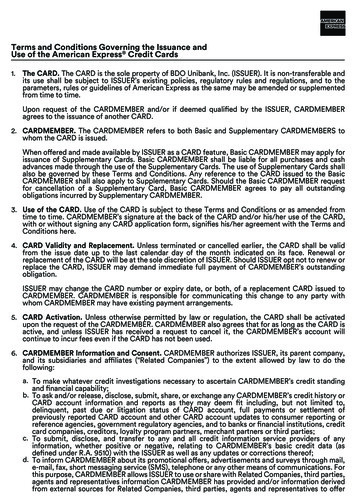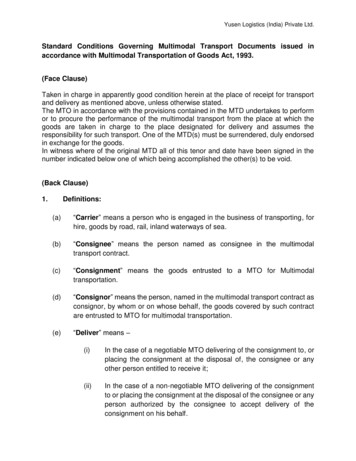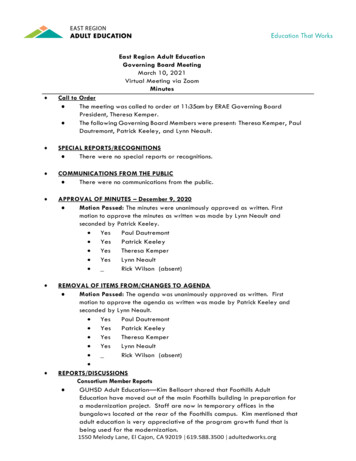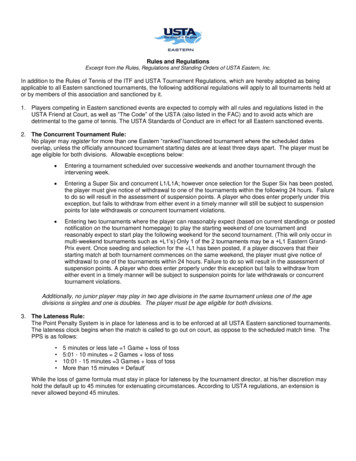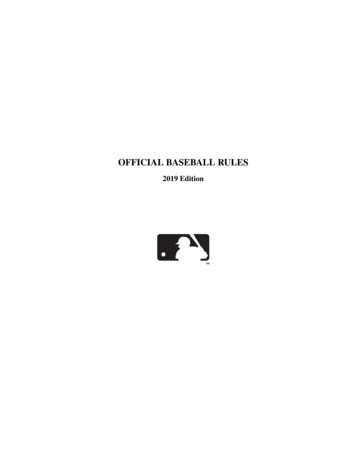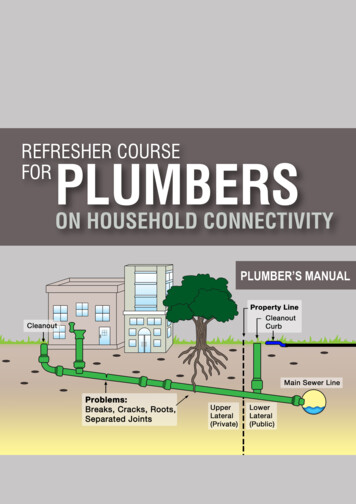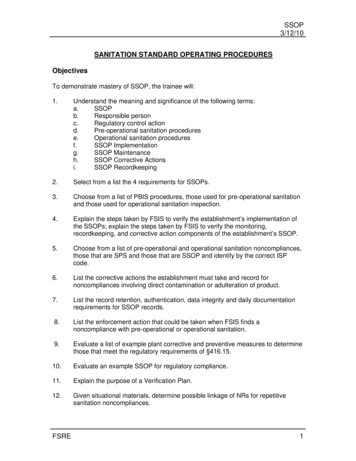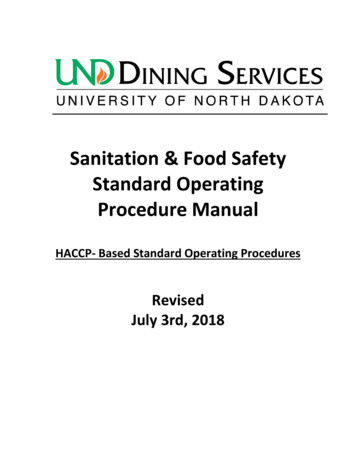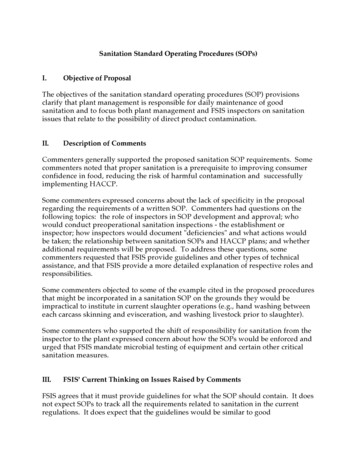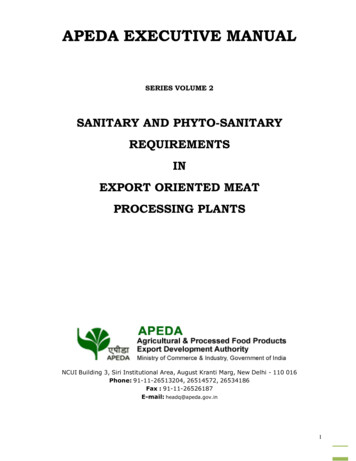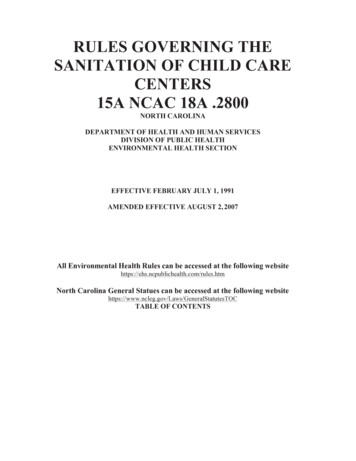
Transcription
RULES GOVERNING THESANITATION OF CHILD CARECENTERS15A NCAC 18A .2800NORTH CAROLINADEPARTMENT OF HEALTH AND HUMAN SERVICESDIVISION OF PUBLIC HEALTHENVIRONMENTAL HEALTH SECTIONEFFECTIVE FEBRUARY JULY 1, 1991AMENDED EFFECTIVE AUGUST 2, 2007All Environmental Health Rules can be accessed at the following th Carolina General Statues can be accessed at the following OCTABLE OF CONTENTS
PAGENC G.S. 7.2808.2809.2810DEFINITIONS . 8APPROVAL OF CONSTRUCTION AND RENOVATION PLANS . 9HANDWASHING . 10FOOD SUPPLIES . 10FOOD PROTECTION . 11FOOD STORAGE AND PROTECTION . 11FOOD PREPARATION . 12FOOD SERVICE . 13FOOD SERVICE EQUIPMENT AND UTENSILS. 14SPECIFICATIONS FOR KITCHENS, FOOD PREPARATION AREASAND FOOD SERVICE AREAS . 14REPEALED . 15CLEANING AND SANITIZING EQUIPMENT AND UTENSILS . 15MECHANICAL CLEANING AND SANITIZING . 16FOOD SERVICE EQUIPMENT AND UTENSIL STORAGE . 16WATER SUPPLY . 16LEAD POISONING HAZARDS . 17TOILETS . 18LAVATORIES . 19DIAPERING AND DIAPER CHANGING FACILITIES . 19STORAGE . 20BEDS, COTS, MATS AND LINENS . 21TOYS, EQUIPMENT AND FURNITURE . 21PERSONNEL. 21FLOORS . 22WALLS AND CEILINGS . 22LIGHTING AND THERMAL ENVIRONMENT . 22COMMUNICABLE DISEASES AND CONDITIONS . 23HANDWASHING . 23WASTEWATER . 23SOLID WASTES . 23ANIMAL AND VERMIN CONTROL: PREMISES . 24OUTDOOR LEARNING ENVIRONMENT AND PREMISES . 25SWIMMING AND WADING POOLS . 25COMPLIANCE, INSPECTIONS AND REPORTS . 26APPEALS PROCEDURE . 29MILDLY ILL CHILDREN . 30.2831.2832.2833.2834.2835.2836EHS 1617 – INSPECTION OF CHILD CARE CENTERS2
§ 110-91. Mandatory standards for a license.All child care facilities shall comply with all State laws and federal laws and local ordinances that pertain tochild health, safety, and welfare. Except as otherwise provided in this Article, the standards in this section shall becomplied with by all child care facilities. However, none of the standards in this section apply to the school-agechildren of the operator of a child care facility but do apply to the preschool-age children of the operator. Children13 years of age or older may receive child care on a voluntary basis provided all applicable required standards aremet. The standards in this section, along with any other applicable State laws and federal laws or local ordinances,shall be the required standards for the issuance of a license by the Secretary under the policies and procedures of theCommission except that the Commission may, in its discretion, adopt less stringent standards for the licensing offacilities which provide care on a temporary, part-time, drop-in, seasonal, after-school or other than a full-time basis.(1)Medical Care and Sanitation. – The Commission for Public Health shall adopt rules whichestablish minimum sanitation standards for child care centers and their personnel. The sanitationrules adopted by the Commission for Public Health shall cover such matters as the cleanliness offloors, walls, ceilings, storage spaces, utensils, and other facilities; adequacy of ventilation;sanitation of water supply, lavatory facilities, toilet facilities, sewage disposal, food protectionfacilities, bactericidal treatment of eating and drinking utensils, and solid-waste storage anddisposal; methods of food preparation and serving; infectious disease control; sleeping facilities;and other items and facilities as are necessary in the interest of the public health. The Commissionfor Public Health shall allow child care centers to use domestic kitchen equipment, providedappropriate temperature levels for heating, cooling, and storing are maintained. Child care centersthat fry foods shall use commercial hoods. These rules shall be developed in consultation with theDepartment.The Commission shall adopt rules for child care facilities to establish minimum requirementsfor child and staff health assessments and medical care procedures. These rules shall be developedin consultation with the Department. Each child shall have a health assessment before beingadmitted or within 30 days following admission to a child care facility. The assessment shall bedone by: (i) a licensed physician, (ii) the physician's authorized agent who is currently approvedby the North Carolina Medical Board, or comparable certifying board in any state contiguous toNorth Carolina, (iii) a certified nurse practitioner, or (iv) a public health nurse meeting theDepartments Standards for Early Periodic Screening, Diagnosis, and Treatment Program.However, no health assessment shall be required of any staff or child who is and has been innormal health when the staff, or the child's parent, guardian, or full-time custodian objects inwriting to a health assessment on religious grounds which conform to the teachings and practice ofany recognized church or religious denomination.Organizations that provide prepared meals to child care centers only are considered child carecenters for purposes of compliance with appropriate sanitation standards.(2)Health-Related Activities. –a.through f. Repealed by Session Laws 2012-142, s. 10.1(c1), effective July 1, 2012.g.Nutrition standards. – The Commission shall adopt rules for child care facilities to ensurethat food and beverages provided by a child care facility are nutritious and align withchildren's developmental needs. The Commission shall consult with the Division of ChildDevelopment and Early Education of the Department of Health and Human Services todevelop nutrition standards to provide for requirements appropriate for children ofdifferent ages. In developing nutrition standards, the Commission shall consider thefollowing recommendations:1.Limiting or prohibiting the serving of sweetened beverages, other than onehundred percent (100%) fruit juice to children of any age.2.Limiting or prohibiting the serving of whole milk to children two years of age orolder or flavored milk to children of any age.3.Limiting or prohibiting the serving of more than six ounces of juice per day tochildren of any age.4.Limiting or prohibiting the serving of juice from a bottle.h.Parental exceptions. –1.Parents or guardians of a child enrolled in a child care facility may (i) providefood and beverages to their child that may not meet the nutrition standards3
(3)(4)(5)(6)adopted by the Commission and (ii) opt out of any supplemental food programprovided by the child care facility. The child care facility shall not provide foodor beverages to a child whose parent or guardian has opted out of anysupplemental food program provided by the child care facility and whose parentor guardian is providing food and beverages for the child.2.The Commission, the Division of Child Development and Early Education ofthe Department of Health and Human Services, or any State agency orcontracting entity with a State agency shall not evaluate the nutritional value oradequacy of the components of food and beverages provided by a parent orguardian to his or her child enrolled in a child care facility as an indicator ofenvironmental quality ratings.i.Rest time. – Each child care facility shall have a rest period for each child in care afterlunch or at some other appropriate time and arrange for each child in care to be out-ofdoors each day if weather conditions permit.Location. – Each child care facility shall be located in an area which is free from conditions whichare considered hazardous to the physical and moral welfare of the children in care in the opinionof the Secretary.Building. – Each child care facility shall be located in a building which meets the appropriaterequirements of the North Carolina Building Code under standards which shall be developed bythe Building Code Council, subject to adoption by the Commission specifically for child carefacilities, including facilities operated in a private residence. These standards shall be consistentwith the provisions of this Article. A local building code enforcement officer shall approve anyproposed alternate material, design, or method of construction, provided the building codeenforcement officer finds that the alternate, for the purpose intended, is at least the equivalent ofthat prescribed in the technical building codes in quality, strength, effectiveness, fire resistance,durability, or safety. A local building code enforcement officer shall require that sufficientevidence or proof be submitted to substantiate any claim made regarding the alternate. The ChildCare Commission may request changes to the Building Code to suit the special needs of preschoolchildren. Satisfactorily written reports from representatives of building inspection agencies shallbe required prior to the issuance of a license and whenever renovations are made to a child carecenter, or when the operator requests licensure of space not previously approved for child care.Fire Prevention. – Each child care facility shall be located in a building that meets appropriaterequirements for fire prevention and safe evacuation that apply to child care facilities asestablished by the Department of Insurance in consultation with the Department. Except for childcare centers located on State property, each child care center shall be inspected at least annually bya local fire department or volunteer fire department for compliance with these requirements. Childcare centers located on State property shall be inspected at least annually by an official designatedby the Department of Insurance.Space and Equipment Requirements. – There shall be no less than 25 square feet of indoor spacefor each child for which a child care center is licensed, exclusive of closets, passageways,kitchens, and bathrooms, and this floor space shall provide during rest periods 200 cubic feet ofairspace per child for which the center is licensed. There shall be adequate outdoor play area foreach child under rules adopted by the Commission which shall be related to the size of center andthe availability and location of outside land area. In no event shall the minimum required exceed75 square feet per child. The outdoor area shall be protected to assure the safety of the childrenreceiving child care by an adequate fence or other protection. A center operated in a public schoolshall be deemed to have adequate fencing protection. A center operating exclusively during theevening and early morning hours, between 6:00 P.M. and 6:00 A.M., need not meet the outdoorplay area requirements mandated by this subdivision.Each child care facility shall provide indoor area equipment and furnishings that are childsize, sturdy, safe, and in good repair. Each child care facility that provides outdoor area equipmentand furnishings shall provide outdoor area equipment and furnishings that are child size, sturdy,free of hazards that pose a threat of serious injury to children while engaged in normal playactivities, and in good repair. The Commission shall adopt standards to establish minimumrequirements for equipment appropriate for the size of child care facility. Space shall be available4
(7)(8)for proper storage of beds, cribs, mats, cots, sleeping garments, and linens as well as designatedspace for each child's personal belongings.The Division of Child Development of the Department of Health and Human Services shallestablish and implement a policy that defines any building which is currently approved for schooloccupancy and which houses a public or private elementary school to include the playgrounds andathletic fields as part of the school building when that building is used to serve school-age childrenin after-school child care programs. Playgrounds and athletic fields referenced in this section thatdo not meet licensure standards promulgated by the North Carolina Child Care Commission shallbe noted on the program's licensure and rating information.Staff-Child Ratio and Capacity for Child Care Facilities. – In determining the staff-child ratio inchild care facilities, all children younger than 13 years old shall be counted.a.The Commission shall adopt rules for child care centers regarding staff-child ratios,group sizes and multi-age groupings other than for infants and toddlers, provided thatthese rules shall be no less stringent than those currently required for staff-child ratios asenacted in Section 156(e) of Chapter 757 of the 1985 Session Laws.1.Except as otherwise provided in this subdivision, the staff-child ratios and groupsizes for infants and toddlers in child care centers shall be no less stringent thanas follows:AgeRatio Staff/ChildrenGroup Size0 to 12 months1/51012 to 24 months1/6122 to 3 years1/1020.No child care center shall care for more than 25 children in one group.Child care centers providing care for 26 or more children shall provide for twoor more groups according to the ages of children and shall provide separatesupervisory personnel and separate identifiable space for each group.2.When any preschool-aged child is enrolled in a child care center and thelicensed capacity of the center is six through 12 children, the staff-child ratiosshall be no less stringent than as follows:AgeRatio Staff/Children0 to 12 months1/5 preschool children plus 3 additionalschool-aged children12 to 24 months1/6 preschool children plus 2 additionalschool-aged children.The following shall also apply:I.There is no specific group size.II.When only one caregiver is required to meet the staff-child ratio, theoperator shall make available to parents the name, address, and phonenumber of an adult who is nearby and available for emergency relief.III.Children shall be supervised at all times. All children who are notasleep or resting shall be visually supervised. Children may sleep orrest in another room as long as a caregiver can hear them and respondimmediately.b.Family Child Care Home Capacity. – Of the children present at any one time in a familychild care home, no more than five children shall be preschool-aged, including theoperator's own preschool-age children.Qualifications for Staff. – All child care center administrators shall be at least 21 years of age. Allchild care center administrators shall have the North Carolina Early Childhood AdministrationCredential or its equivalent as determined by the Department. All child care administratorsperforming administrative duties as of the date this act becomes law and child care administratorswho assume administrative duties at any time after this act becomes law and until September 1,1998, shall obtain the required credential by September 1, 2000. Child care administrators whoassume administrative duties after September 1, 1998, shall begin working toward the completionof the North Carolina Early Childhood Administration Credential or its equivalent within sixmonths after assuming administrative duties and shall complete the credential or its equivalent5
(8a)(9)(10)(11)within two years after beginning work to complete the credential. Each child care center shall beunder the direction or supervision of a person meeting these requirements. All staff countedtoward meeting the required staff-child ratio shall be at least 16 years of age, provided that personsyounger than 18 years of age work under the direct supervision of a credentialed staff person whois at least 21 years of age. All lead teachers in a child care center shall have at least a NorthCarolina Early Childhood Credential or its equivalent as determined by the Department. Leadteachers shall be enrolled in the North Carolina Early Childhood Credential coursework or itsequivalent as determined by the Department within six months after becoming employed as a leadteacher or within six months after this act becomes law,
size, stu rdy, safe, and in good repair. Each child care facility that provides outdoor area equipment and furnishings shall provide outdoor area equipment and furnishings that are child size, sturdy, free of hazards that pose

